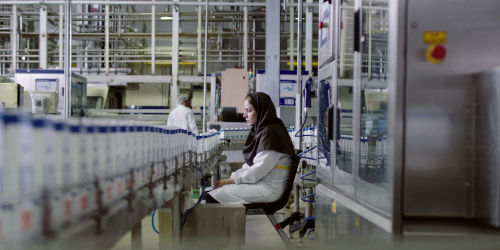
Amin Jafari
MOVIE REVIEW
Ballad of a White Cow (2021)
“Ballad of a White Cow” is about a woman who, offered the choice of cake or death, rejects the cake every time. It’s a bitter pill to swallow and a bitter film to watch.
Mina’s (Maryam Moghaddam, who not only cowrote the screenplay with Behtash Sanaeeha and Mehrdad Kouroshnia, but codirected with Mr. Sanaeeha) husband Babak was convicted of murder and put to death a year before the main action starts. In all that time, she has been unable to bring herself to file for government assistance, instead living off her measly job in a milk factory. She has further been unable to tell her little daughter Bita (Avin Purraoufi), who is deaf, the truth about Babak’s absence; instead she maintains that he is studying abroad and will return soon. Bita acts out in school, and otherwise spends her time watching old movies, including those of Shirley Temple. Mina herself has neither family nor friends; instead her only contact is with her brother-in-law (Pourya Rahimisam), the messenger of her unpleasant (and unseen) father-in-law, who will not cede Mina control of her own life. His demands that Mina give up her job and allow herself to be protected/controlled by the family are firmly rejected, but they know as well as Mina does that her options are running out.
But one day there is a knock on the door. It’s a man named Reza (Alireza Sanifar) who introduces himself as an old association of Babak’s. He owed Babak a large debt and has finally come around to make good. Mina is confused; Babak never mentioned him. Reza is a rumpled man, with the perpetual air of someone startled out of a bad dream, but his knowledge of Mina’s life and calm insistence on giving her the money allows her to ignore her puzzlement and take the cash. But a few days later, the landlady mentions that her husband saw a man unrelated to Mina enter her apartment, and the troubles really start.
Mina is something of a cipher. Her loyalty to Babak is never properly fleshed out – there’s no real sense that she still loves her man, despite all the steps she does in order to try and get justice. Instead Mina seems to be angrier at the injustice done to herself, that her husband was taken away from her. And there are many injustices; when she tries to see people at the law courts, messages are passed on by harried clerks who won’t even make eye contact. When she does swallow her pride and ask for government help, the clerk has the nerve to ask what she did while pregnant to cause Bita’s deafness. And when someone finally does meet with Mina face to face, the passive language used hides an unremittingly cruel piece of news. But Mina’s tears in this moment are for herself.
As the true nature of Reza’s relationship with Babak becomes clear – in a beautifully shot piece of rather dull exposition – the plot holes become harder to ignore. In a weird way, this seems to be the point. Mina is deliberately being kept in the dark by everyone around her – the justice system, her in-laws, Reza himself. If the patriarchy will not give her a fair chance, what other choice does she have but to keep throwing tantrums? When no one else feels sorry for her, it’s no wonder her feelings curdle. She’s a rat in a trap. Side characters repeatedly exhort Reza and Mina to forget their pasts and accept their fates using whatever numbing agent they prefer, the options being movies, Turkish soap operas, drink or heroin. Reza seems to prefer self-harm, while Mina has her rage to keep her warm.
But without getting into spoilers, there’s a pretty good alternative right there. While it’s believable that Mina’s heart could be both this hard and self-pitying, the reasons shown for her to do what she does feel weak in comparison. The movie’s fatalism is depressing, but the unshowy cinematography makes it plain Mina’s suffering is nothing special, and her Tehran of grubby flats and the hygienic calm of the factory offers no respite. Everything’s either stained or artificial. The passive resignation around her is one thing, so it could be argued that Mina’s decision is an act of courage. But if it is, it’s the courage of someone who jumps through the scaffold instead of waiting for the drop.
Comments